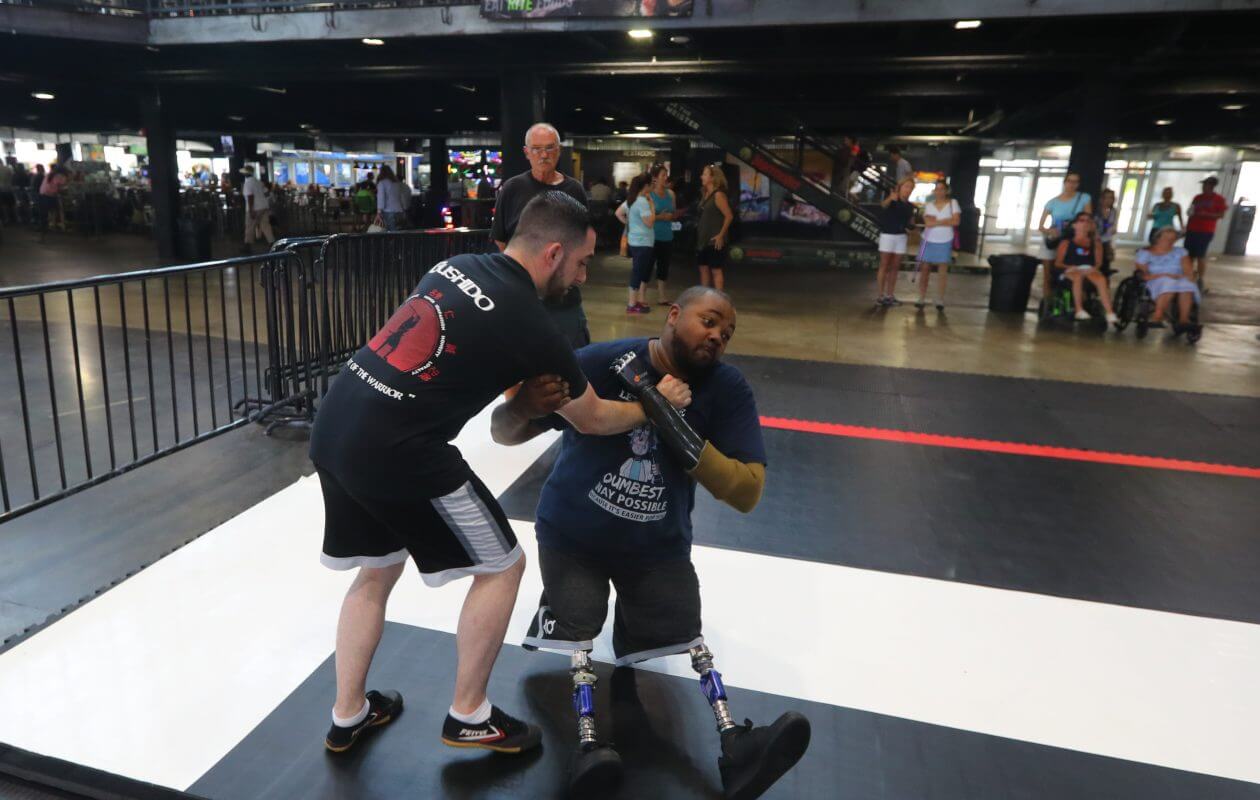(Buffalo, NY) Larry Bailey worked up a sweat Sunday afternoon demonstrating a Jiu Jitsu throw down at RiverWorks on Ganson Street.
“You work with what you have,” said Bailey, wiping his brow. “I know I don’t have my natural knees, but I can use my weight to take someone down.”
Seconds later, Bailey did just that, taking Joseph Serio to the mat with a solid slam – not bad for a triple amputee with a bionic arm.
Bailey, 32, was injured serving with the U.S. Marine Corps in Afghanistan in 2011.
Robert Kunkel looked on like a proud father. The 70-year-old Vietnam War veteran trained Bailey in the Japanese martial art at Walter Reed National Military Medical Center in Bethesda, Md.
Kunkel said he’s lost track of how many servicemen and women he’s trained over the years.
Kunkel, of Niagara Falls, was 18 and serving in Vietnam when he was hit with an explosive device that injured both legs. Today, the disabled veteran is an athlete in training for the Marine Corps Marathon.
Kunkel parked his hand cycle within sight inside RiverWorks. He bikes 20 miles a day on the custom $6,000 cycle.
Through his work providing defense training for disabled vets, Kunkel made lifelong friends. He said the key to his program’s success is modifying the lesson plan to fit the abilities of his students.
“I take bits and pieces from different jujitsu throws to craft one that works. Everyone moves differently,” Kunkel explained. “I make sure each individual comes away with a valid street defense technique, not something you learn on TV that doesn’t work.”
“You’d be surprised how many injured vets are attacked or knocked out of their wheelchairs,” Kunkel said. “At Walter Reed, a lot of the vets don’t even want to go out in public. They’re easy targets.”
Bailey is gearing up to open a coffee shop in Sumerduck, Va. He drove up with another veteran from Virginia to help Kunkel demonstrate his adaptive jiujitsu program. Bailey said he never was attacked, but he has experienced aggressive behavior targeting him.
“Most people don’t bother you without reason, but you get drunk people being stupid,” Bailey said. “The time I did need to get physical with someone they were drunk. I gripped his shoulder and moved him aside.”
Serio, a graduate of SUNY Buffalo State, is not a military veteran or disabled. He traveled from Atlanta to train with the group after receiving a call from Kunkel.
“You can learn to modify the moves, but it’s better to learn from someone who faces similar challenges who can show you,” said Serio.
The demand for adaptive sports programs for disabled veterans sparked the formation of Higher Ground New York, said Kathy Weppner, who is a founding member of the national group that sponsors therapeutic treatment programs for veterans with disabilities.
Weppner, who attended the jiujutsu demonstration at RiverWorks, met Kunkel at Walter Reed.
“You have a bunch of injured guys who think their lives are over,” Weppner said. “They’re all in their 20s. They have significant injuries. They’ve lost limbs. They’re all standing off to the side until one steps forward.”
“Am I going to teach them to become martial artists? Absolutely not,” said Kunkel. “But they will have the keys to open doors and do something they thought they could never do. I’ll have them throwing people to the floor.”
(Curated Article View Original Article at buffalonews.com)
Andy Gonzalez is a coach at Aces Jiu Jitsu Club. He has earned his BJJ Brown Belt under 2nd Degree Black Belt, Professor Mikal Abdullah. Follow Andy on Twitter at @GoGoGonzilla
Andy lives in Austin, Texas with his wife Amanda and their 3 beautiful children. Andy is also the father of a Marine who is honorably serving in the United States Marine Corps.

